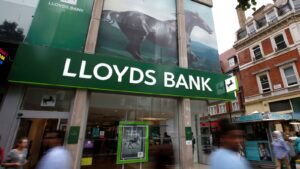
Lloyds Banking Group has promised to pay out up to £3.6 billion to shareholders even though profits growth stalled and the bank warned of a “deteriorating” economic outlook.
The bank lifted its full-year dividend by 20 per cent to £1.6 billion and pledged up to £2 billion in share buybacks, a bumper combined payout equivalent to more than one-tenth of its entire stock market value.
Pre-tax profits in 2022 were flat at £6.9 billion as progress on revenue and costs was offset by a sharp increase in money set aside to cover borrower defaults. These impairments came in at £1.52 billion, including £465 million in the final quarter of 2022.
The bank opened itself up to more criticism over failing to pass on base rate benefits to savers as it revealed that its net interest margin widened dramatically in the final quarter of 2022 to 3.22 per cent. Lloyds has now fattened its margins in eight successive quarters.
However, it added that the net interest margin this year would only be “more than 3.05 percentage points”. Net margin is the difference between the average rate the bank pays on deposits and the the average rate it collects from borrowers
Lloyds said it expected the margin to fall over the course of this year as mortgage customers moved to new deals and as customers shifted money out of current accounts into higher-yielding savings accounts.
It also said the margin-boosting benefit of a rising base rate would cease, forecasting that the benchmark rate would not go any higher than the current 4 per cent. It said it was now predicting a mild recession this year with GDP declining by 1-1.2 per cent and house prices falling by 7 per cent.
Shares in Lloyds dropped 1½p, or 2.7 per cent, to 49½p in early trading on the back of shareholder disappointment about the narrowing margin.
Lloyds is one of the biggest banks in Britain with 26 million customer relationships across its Lloyds, Scottish Widows, Bank of Scotland, MBNA and Halifax brands. It has about 1,200 branches and around 3 million small shareholders, mostly as a result of the demutualisation of the Halifax building society.
It was rescued with £20 billion of government cash in 2008, with the Treasury exiting its investment in 2017. It is valued today at £34 billion.
Charlie Nunn, chief executive, described the financial performance as “robust, with strong income growth, continued franchise strength and strong capital generation, enabling increased capital returns for shareholders”.
The underlying default experience remained “very benign”, he added.
Nunn was paid £3.77 million in the year, the newly published annual report discloses. That is down from £5.52 million the previous year, when he received a special “buy-out” payment from Lloyds to compensate him for bonuses lost by leaving HSBC.
The overall bonus pool for all staff was set at £446 million, up from £399 million.
The impairment cost represented a major swing from last time, when the bank was able to write back £1.39 billion of previously booked bad debt provisions. Before impairments, “underlying profit” was up 46 per cent to £9 billion, Lloyds said.
A final 1.6p per share dividend makes a total for the year of 2.4p. The new buyback plan of “up to £2 billion” follows a £2 billion buyback last year.
Read more:
Lloyds promises bumper payout for shareholders






